Aromatherapy has become a popular way to create a welcoming atmosphere for clients in various professional settings. The power of scent can evoke feelings of comfort, relaxation, and familiarity, making clients feel more at ease during their visit.
Choosing the right scents can significantly impact a client’s experience, potentially leading to increased satisfaction and loyalty.
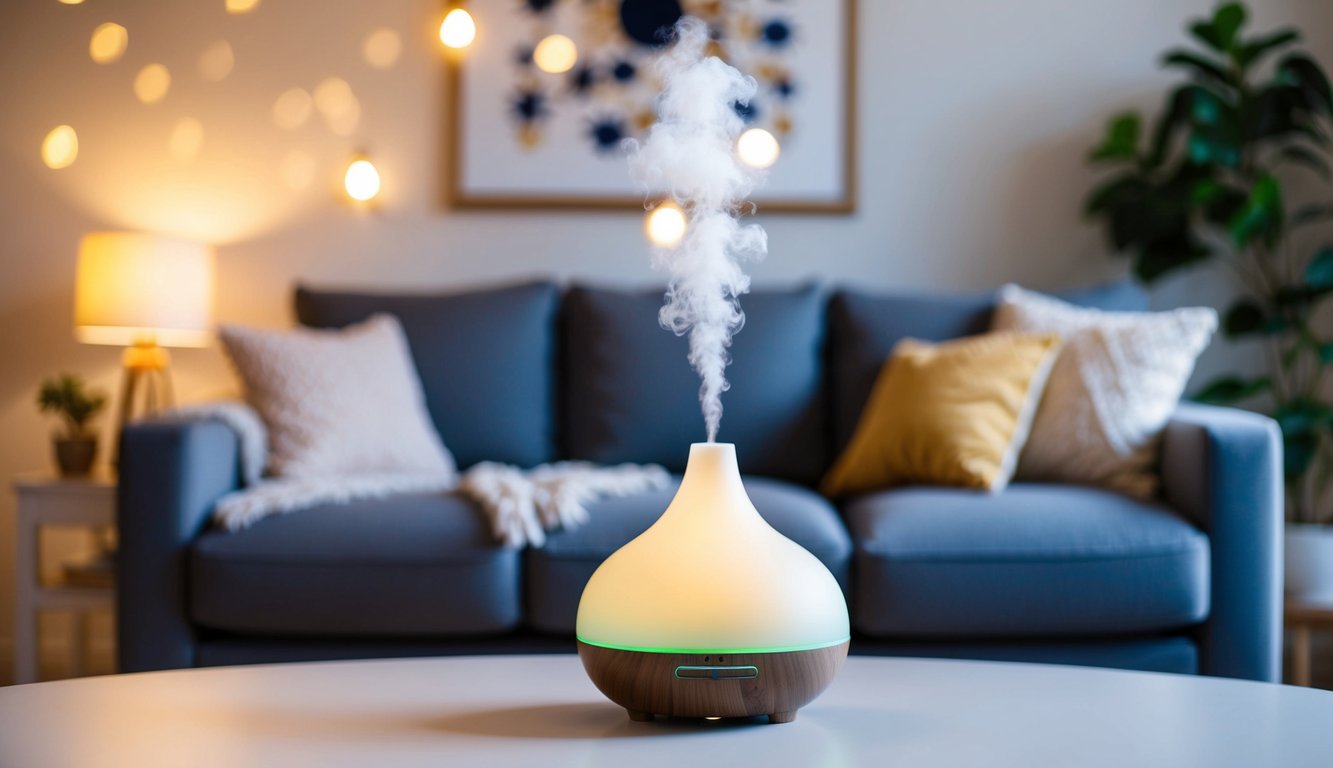
When selecting aromatherapy options, it’s important to consider the specific needs and preferences of your clientele. Some scents, like lavender, are known for their calming properties. Meanwhile, others, such as citrus fragrances, can create an energizing and uplifting environment.
By carefully curating a selection of essential oils, you can create a cozy and inviting atmosphere that resonates with your clients and enhances their overall experience.
Key Takeaways
- Aromatherapy can create a welcoming atmosphere and improve client satisfaction
- Different scents evoke various emotional responses and can be tailored to specific spaces
- Proper selection and application of essential oils is crucial for maximizing aromatherapy benefits
Understanding Aromatherapy and Its Psychological Effects
Aromatherapy harnesses the power of scent to influence mood and well-being. The practice relies on essential oils extracted from plants to create specific psychological effects, ranging from relaxation to increased focus.
The Science of Scent and Emotion
Your sense of smell is directly connected to the limbic system, the part of your brain responsible for emotions and memories. When you inhale essential oil molecules, they stimulate olfactory receptors that send signals to your brain. This process can trigger emotional responses and influence your mood.
Different scents can evoke distinct feelings:
- Lavender: Calming and relaxing
- Peppermint: Energizing and focusing
- Citrus: Uplifting and mood-boosting
Research has shown that certain essential oils can reduce stress, improve sleep quality, and enhance cognitive performance. Your brain forms associations between scents and experiences, which explains why a particular fragrance might remind you of a specific place or time.
How Aromatherapy Influences Client Comfort
When you use aromatherapy in your space, you create an environment that can significantly impact your clients’ comfort levels. Carefully chosen scents can help clients feel more at ease and receptive to your services.
Consider these aromatherapy strategies:
- Use calming scents like lavender or chamomile to reduce anxiety in waiting areas.
- Incorporate invigorating scents like rosemary or lemon in workspaces to boost energy and focus.
- Rotate scents seasonally to create a fresh, welcoming atmosphere.
By tailoring your scent choices to your clients’ needs, you can enhance their experience and potentially improve outcomes. Remember that individual preferences vary, so it’s wise to use subtle diffusion methods and be open to feedback from your clients about the scents you choose.
Essential Oils That Evoke Feelings of Home and Relaxation
Certain essential oils can transform a space into a cozy, inviting environment that feels like home. These scents tap into our emotions and memories, creating a sense of comfort and relaxation.
Lavender: The Universal Calming Agent
Lavender is renowned for its calming and relaxing properties. Its sweet, floral aroma can help reduce anxiety and promote better sleep. You can use lavender oil in a diffuser or add a few drops to your pillow before bed.
For a quick relaxation boost, try inhaling lavender oil directly from the bottle. Its versatility makes it perfect for creating a tranquil atmosphere in any room of your home.
Consider mixing lavender with other calming scents like chamomile or vanilla for a unique blend that enhances relaxation.
Vanilla: Warmth and Comfort
Vanilla’s sweet, rich scent evokes feelings of warmth and comfort. It can remind you of freshly baked goods and cozy evenings at home. Vanilla essential oil can help reduce stress and anxiety, promoting a sense of peace and well-being.
Try adding vanilla oil to a bath for a luxurious, relaxing experience. You can also use it in a diffuser to fill your living space with its comforting aroma.
Vanilla pairs well with other essential oils like lavender or sandalwood for a more complex, soothing scent profile.
Citrus Scents: Uplifting and Refreshing
Citrus essential oils like orange and lemon can uplift your mood and create a fresh, clean atmosphere in your home. These scents are known for their energizing properties and can help boost your mental clarity.
Use citrus oils in your kitchen or living areas to create a vibrant, welcoming environment. They’re particularly effective in the morning to help you start your day on a positive note.
Try blending different citrus oils like grapefruit, bergamot, and lime for a complex, invigorating scent that keeps you feeling refreshed throughout the day.
Eucalyptus: Clean and Invigorating
Eucalyptus oil offers a fresh, clean scent that can make your home feel more spacious and airy. Its natural antimicrobial properties can help purify the air in your home, promoting a healthier environment.
Use eucalyptus oil in your bathroom or bedroom to create a spa-like atmosphere. It’s particularly beneficial during cold and flu season, as its scent can help clear congestion and promote easier breathing.
Consider blending eucalyptus with peppermint or tea tree oil for an even more invigorating and purifying effect.
Cedarwood: Grounding and Earthy
Cedarwood essential oil provides a warm, woody scent that can create a grounding and comforting atmosphere in your home. Its earthy aroma can help reduce stress and promote feelings of security and stability.
Use cedarwood oil in your living room or study to create a cozy, focused environment. It’s particularly effective in the evening to help you unwind after a long day.
Try blending cedarwood with other woody scents like sandalwood or pine for a rich, forest-like aroma that brings nature indoors.
Strategically Selecting Scents for Different Spaces
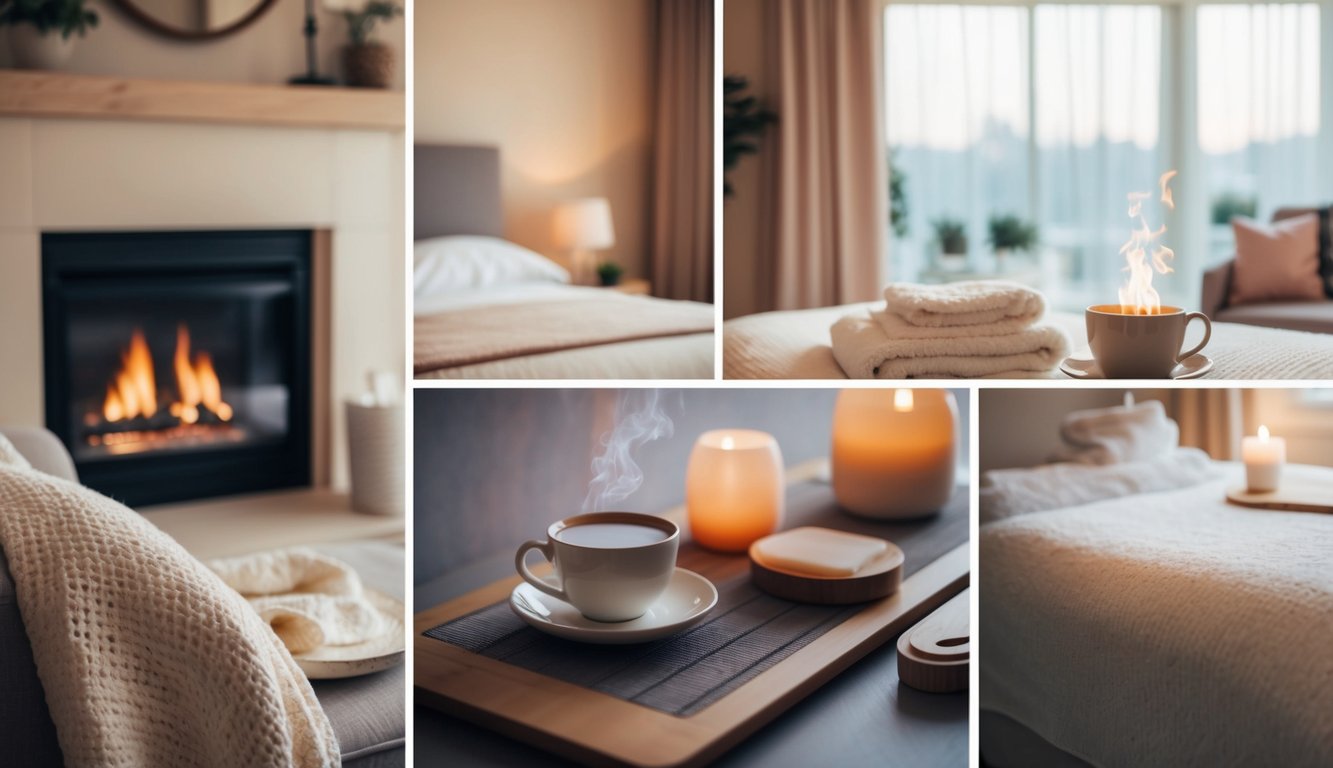
Choosing the right scents for specific areas in your business can significantly enhance your clients’ experience. Each space serves a unique purpose and requires careful consideration when selecting fragrances.
Reception Areas: First Impressions Matter
Your reception area sets the tone for the entire visit. Choose welcoming and invigorating scents that create a positive first impression. Citrus notes like lemon or orange can energize and uplift, while lavender provides a calming effect.
Consider using a blend of fragrances to create a signature scent for your brand. This unique aroma will become associated with your business, leaving a lasting memory for clients.
Adjust scent intensity based on the size of your reception area. Larger spaces may require stronger fragrances, while smaller areas benefit from subtler scents.
Treatment Rooms: Creating a Relaxing Environment
In treatment rooms, focus on soothing and calming scents that promote relaxation and well-being. Lavender, chamomile, and vanilla are excellent choices for their stress-reducing properties.
Consider using essential oil diffusers for a more natural and therapeutic approach. These allow you to easily change scents based on client preferences or treatment types.
Avoid overpowering fragrances that might interfere with treatments or cause discomfort. Opt for lighter, clean scents that complement rather than dominate the space.
Waiting Areas: Keeping Clients Calm and Comfortable
In waiting areas, aim for a balance between relaxation and alertness. Scents like patchouli with velvety rose can create a chic, calming atmosphere.
Use scent to mask any unpleasant odors that may waft from treatment rooms or other areas. Fresh, clean fragrances like linen or cotton work well for this purpose.
Consider changing scents seasonally to keep the environment interesting for regular clients. Light, floral scents in spring and warm, spicy aromas in winter can create a dynamic sensory experience.
Practical Tips for Incorporating Aromatherapy in Professional Settings
Implementing aromatherapy in your workplace can enhance the environment and boost productivity. Consider the following methods, blending techniques, and safety precautions to create an effective and welcoming aromatic atmosphere.
Diffusion Methods: Pros and Cons
Diffusion techniques play a crucial role in spreading scents throughout your professional space. Ultrasonic diffusers are popular for their quiet operation and ability to humidify the air. They’re ideal for larger areas but require regular cleaning.
Nebulizing diffusers disperse pure essential oils without water, making them potent and effective. However, they can be noisy and use oils quickly.
Reed diffusers offer a passive, maintenance-free option. They’re great for small spaces like restrooms or reception areas but may not be strong enough for larger rooms.
Electric heat diffusers are cost-effective and silent. Be cautious, as heat can alter the therapeutic properties of some oils.
Blending Scents for Maximum Effect
Creating effective aromatherapy blends can significantly impact your work environment. Start with a base note like sandalwood or cedarwood for grounding effects. Add middle notes such as lavender or rosemary to promote relaxation and focus.
Top it off with invigorating scents like peppermint or lemon. This combination can enhance mood and productivity. Experiment with ratios, typically using 3-5 drops of each oil per 100ml of water in a diffuser.
Keep seasonal changes in mind. Lighter, fresher scents work well in summer, while warmer, spicier blends suit winter months.
Safety Considerations and Allergies
Prioritize safety when introducing aromatherapy to your workplace. Always use high-quality, pure essential oils from reputable sources. Dilute oils properly to prevent skin irritation or respiratory issues.
Inform your staff and clients about the use of aromatherapy. Place visible signs indicating which scents are in use. This helps those with sensitivities or allergies avoid potential reactions.
Provide an opt-out option for individuals who prefer scent-free environments. Consider designating certain areas as fragrance-free zones.
Rotate scents regularly to prevent olfactory fatigue and maintain the effectiveness of your aromatherapy program.
Case Studies and Success Stories
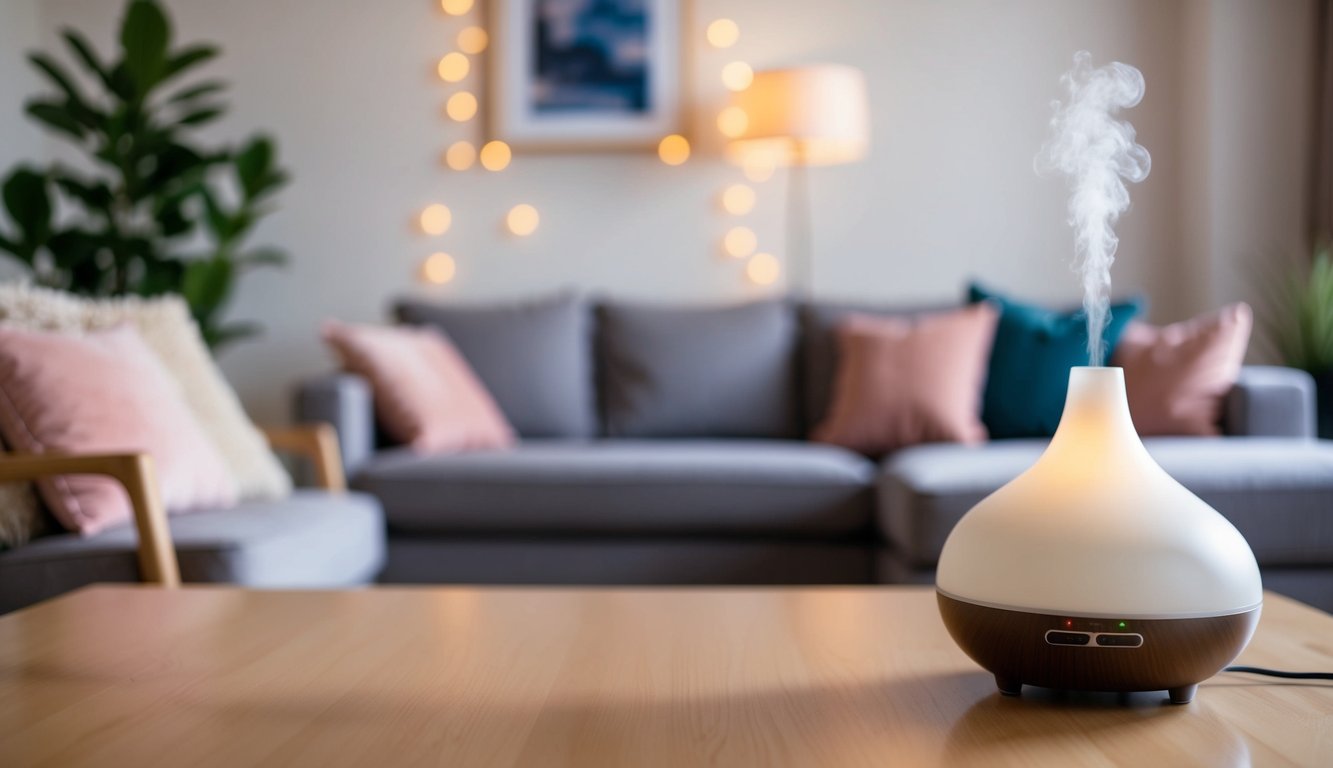
Aromatherapy has transformed workplaces and improved client experiences across various industries. From boosting employee productivity to creating welcoming environments for customers, the power of scent has proven its worth.
Real-World Examples of Effective Aromatherapy Use
Nina, a team leader, introduced aromatherapy to her office after noticing declining concentration and morale. She used invigorating citrus scents for morning meetings and calming lavender in the afternoon.
The results were remarkable. Team members reported feeling more energized and focused during brainstorming sessions. Afternoon slumps decreased, and overall productivity improved.
In another case, a spa owner implemented a signature scent blend throughout their facility. Clients commented on the soothing atmosphere created by the gentle aroma of lavender and vanilla. This led to increased repeat bookings and positive word-of-mouth referrals.
Testimonials from Satisfied Clients
“The moment I walk into the office, the refreshing scent of peppermint awakens my senses. It’s like a natural energy boost!” – Sarah, marketing executive
“I was skeptical at first, but the calming lavender diffused in our meeting rooms has noticeably reduced tension during negotiations.” – Mark, sales manager
Nature’s Gift Aromatherapy, founded by Marge Clark, has helped countless clients find relief through essential oils.
One customer shared, “Their custom blend helped me overcome chronic fatigue. I feel like a new person!”
These testimonials highlight the diverse benefits of aromatherapy in professional settings.
From improved focus to stress reduction, the right scents can significantly enhance your work environment and client experiences.
Conclusion
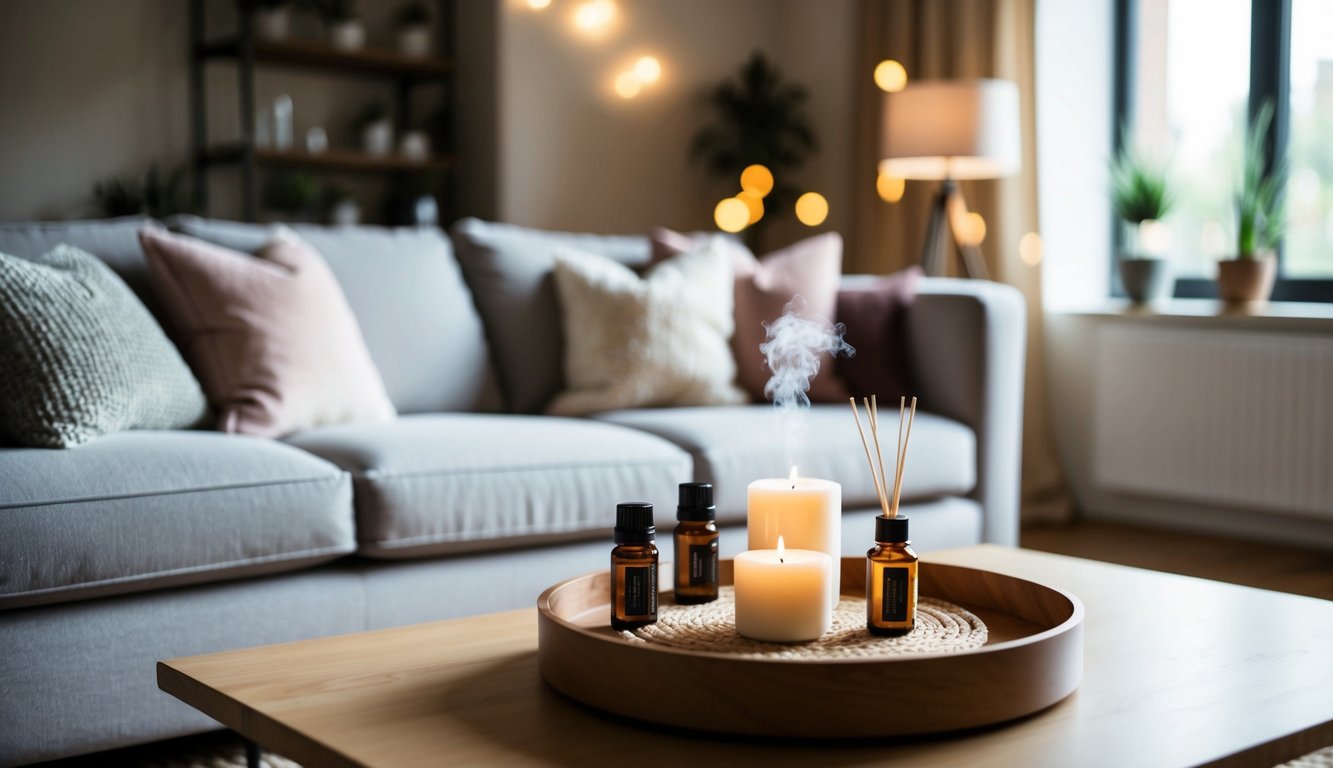
Aromatherapy offers a powerful way to enhance your clients’ experience.
By carefully selecting scents, you can create a welcoming atmosphere that puts people at ease.
Remember to consider your target audience when choosing fragrances. What appeals to one group may not work for another.
Experiment with different essential oils and blends to find what resonates best.
Pay attention to feedback and adjust accordingly.
Always prioritize safety by using high-quality oils and proper dilution techniques. Perform patch tests before applying new oils topically to avoid potential reactions.
Keep in mind that personal preferences play a significant role in scent perception. What you find pleasant may not be universally appealing.
By thoughtfully incorporating aromatherapy into your space, you can create a positive emotional environment that supports your clients’ well-being and keeps them coming back.
Stay informed about new research in aromatherapy to continually refine your approach. The field is constantly evolving, offering new insights into the power of scent.
Frequently Asked Questions
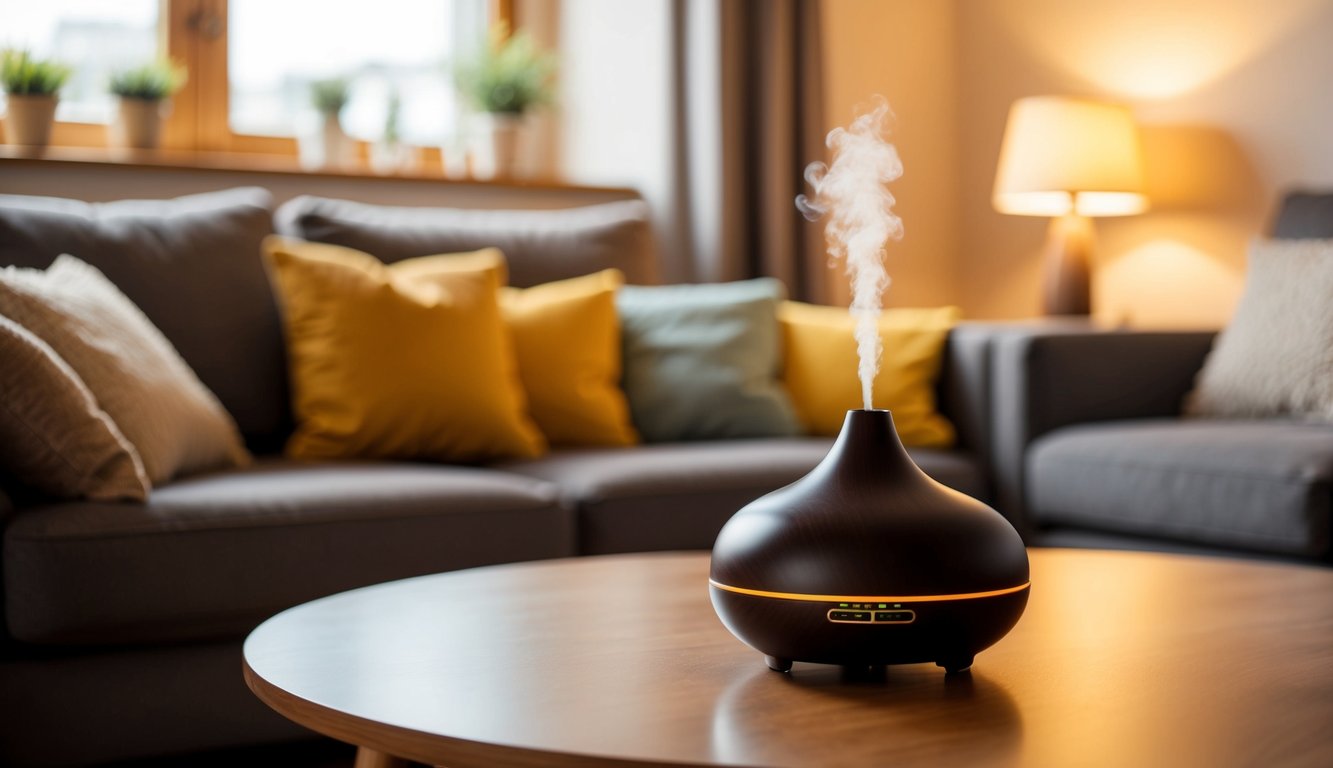
Aromatherapy can significantly impact a home environment, influencing stress levels, mood, and perception of space. Understanding the effects of specific scents and selecting appropriate fragrances for different clients is crucial for creating a welcoming atmosphere.
What are the benefits of incorporating aromatherapy in a home environment?
Aromatherapy can create a specific atmosphere in your home, promoting relaxation and well-being.
You can use essential oils to reduce stress, improve sleep quality, and boost your mood.
Certain scents may also help purify the air and create a more inviting space for guests.
How can specific scents affect a person’s stress levels or relaxation?
Different scents can have varying effects on your nervous system.
For example, lavender can reduce sympathetic nervous activity and lower blood pressure, promoting relaxation.
Citrus scents like lemon or orange can energize and uplift your mood, while chamomile and vanilla are known for their calming properties.
In what ways do particular fragrances alter an individual’s perception of a space?
Fragrances can make a space feel larger, cozier, or more luxurious.
Fresh, clean scents like lemon or pine can make a room feel more spacious and airy.
Warm, spicy aromas like cinnamon or vanilla can create a sense of comfort and intimacy, making a space feel more inviting.
What considerations should be taken into account when selecting fragrances for various types of clients?
Consider your clients’ preferences, allergies, and sensitivities when choosing fragrances.
Some people may find certain scents overwhelming or unpleasant.
You should also take into account the purpose of the space and the desired atmosphere.
For example, energizing scents work well in home offices, while relaxing aromas are better suited for bedrooms.
Can the use of certain scents have a long-term impact on mood and well-being?
Regular use of aromatherapy can have long-term effects on mood and well-being.
Consistent exposure to calming scents may help reduce chronic stress and anxiety.
Some studies suggest that certain essential oils may have cognitive benefits, potentially improving memory and focus over time.
What relationship exists between scent memory and customer satisfaction in a home setting?
Scent is strongly linked to memory and emotion. Pleasant fragrances in your home can create positive associations for guests.
When clients associate your space with a comforting or enjoyable scent, they’re more likely to have positive memories of their visit. This can potentially increase customer satisfaction and loyalty.






